- Home
- Andrea Penrose
Murder on Black Swan Lane Page 11
Murder on Black Swan Lane Read online
Page 11
“It’s quite enough. Thank you,” replied the earl, grateful for the superintendent’s coolheaded and decisive handling of the situation. “As for you and your men . . . in order to work quickly and efficiently, it would be better if my assistant and I could have the room to ourselves.”
“Yes, yes, of course.” Lowell looked around. “Haversham is out of Town. I’ll take my men into his laboratory, which is identical to Drummond’s layout, and go over the procedures for dealing with the damage.”
“Much obliged,” said Wrexford, signaling Tyler to proceed. “I shall come let you know when we are finished.”
He wasted no time in following his valet into the laboratory, and took the precaution of locking the door from the inside.
The reek of smoke hung heavy in the still air, pungent with a harsh chemical tang that burned the throat with every breath. The main Argent lamp had given up the ghost, and the two surviving oil lamps were burning low, their weak flames casting ghoulish shadows over the jumbled furniture and equipment.
Drummond’s body lay half turned on its side, the dark pool of blood spreading slowly through a spill of powdered sulfur. Wrexford repressed a twinge of pity as he stepped over the chemist’s lifeless legs. Would anyone care about his passing?
However odious, no man should die unmourned.
Dismissing such momentary musings, the earl turned his attention to the here and now. “Move the lights closer,” he said to Tyler, indicating the far end of the work counter. A quick search of the drawers revealed one filled with scientific instruments. Wrexford found several pairs of long, needle-nosed tweezers, along with a thin copper spatula, and carried them over to the pile of charred books.
“Let us salvage as much of the note paper as possible,” he said.
Tyler leaned in to assess the damage. “It will be tricky. I suggest we find an undamaged book and place the fragments between the pages. That way, we can always cut through the binding and move them under your microscope for examination.”
“Having a valet who knows more than the fine points of starching a shirt is a distinct advantage in certain situations,” murmured Wrexford.
“I shall remind you of that, said Tyler, after scavaging an unsinged volume from the side closet. “Especially as these ‘certain situations’ appear to be escalating with increasing frequency.” A pause. “Alas, the same cannot be said for my wages.”
“I pay you very well.” The earl handed him one of the tweezers.
“Not well enough to risk a stay in Newgate Prison.”
Wrexford grunted and shifted to allow a better angle at the papers in question. “Hold up the cover of Levoisier’s Treatise on Chemistry so I can better reach the fragments.” What an irony that the famed French chemist was known for his experiments on the role of oxygen in combustion. “And be ready to slide in the spatula to stabilize the paper.”
Holding himself very still, the earl carefully maneuvered his tweezers into the remains of the notes. It required extreme delicacy. The paper was fragile, a mere breath away from crumbling to dust. One errant move . . .
Tyler gave an involuntary wince as a large fleck of ash broke off.
Damnation. Steadying his hand, Wrexford slowly extracted the top fragment and placed it in the undamaged book. His valet ever so gently covered it with several pristine pages.
They repeated the process until all of the fragments had been retrieved. Whether it would yield enough to reveal the dead chemist’s full message remained to be seen.
“Anything else, milord?” inquired Tyler.
Wrexford took a few cursory glances inside the half-burned books. “Nothing of interest here. And we haven’t much time.” He handed his valet the fruits of their labor. “Hide this under your coat and wait in the corridor. I’d rather no one see what we’re removing. I’ll make a quick circuit of the work space and see if I spot any other useful evidence.”
Tyler took the extra precaution of wrapping an old rag around the book. “Very good, sir.”
Wanting to avoid another clash with the Runner, Wrexford hurriedly checked through the instrument cases on the center table and the fallen drawers, hoping to find Drummond’s laboratory journals with the records of his experiments. But they were either burned or buried under the debris. He paused over the chemist’s corpse looking for . . .
He wasn’t sure what. Something was bothering him, but he couldn’t quite put a finger on what.
“Milord, are you finished in there?” Lowell entered gingerly, taking care to keep his well-polished boots clear of the muddled ash and liquids. “Mr. Griffin will be . . .” His voice trailed off in a sharp exhale as he halted abruptly. “Good Lord, what a gruesome sight.”
The earl straightened. As murders went, it was actually quite civilized. However, he kept that thought to himself.
“Hopkins!” Lowell called to one of the unseen workmen. “Send for someone to remove the, er, remains of Mr. Drummond—discreetly, and as soon as possible, mind you.”
“Where will the body be taken?” asked Wrexford.
The question made Lowell grimace. “Good Heavens, what difference does it make? I just want it out of here.”
Wrexford nodded, and left the agitated supervisor to begin the process of clearing the damage. Spotting Tyler near the doorway to one of the side stairs, he joined him and led the way down to the main floor, where they exited the building through the lecture hall.
“Wait here,” he said in a low voice as they turned down Albemarle Street. “I want you to intercept whatever mortuary wagon is called, and have the body taken to Henning’s surgery.”
“Given my charm and your money, that should present no problem, milord,” replied his valet. His tone then turned serious. “Did you spot something irregular?”
“I’m not sure. But Henning has an eye for reading the details of foul play.”
“Very good, sir.” He shifted his hold on the wrapped book.
“In the meantime, I have several visits to make.”
“I shall have the parcel unpacked, and your microscope and magnifying lenses set up by the time you return home,” responded Tyler.
“That may not be for a while,” said Wrexford, thinking about the Runner’s unexpected mention of A. J. Quill’s latest satirical print.
“Aye, well, just remember to keep your temper—and your cutthroat blade—in check,” said Tyler dryly.
His valet might not be speaking so glibly if he knew the truth about Quill.
“After all, they say the pen is mightier than the sword.”
CHAPTER 9
The pen, fumed Wrexford, jamming his hands into his pockets as he walked away from the print shop window, was in this case mightier than a battalion of cavalry sabers. It certainly sliced with far more deadly precision, each stroke a perfectly designed cut.
With an inward wince, he admitted that the satire was perhaps deserved. Neither he nor Canaday had showed to advantage. Though how Charlotte had learned the embarrassing details was a matter for further exploration. A man’s club was supposed to be sacrosanct, a haven where a strict code of honor ruled within its walls, a refuge where one was safe from ridicule.
But apparently those pillared, patrician walls had ears.
And Charlotte would likely retort by asking why should women play by the rules when they were all written by high-and-mighty men.
A fair point, he conceded, albeit a sharp one that was now sticking rather painfully in his arse. His pique was quick to dissipate as he conceded she had warned him that her livelihood depended on feeding juicy tidbits of gossip to the public.
As he climbed into a hackney and ordered it to head east, his thoughts turned back to the morning’s murder and how it was connected to the death of the Right Reverend Josiah Holworthy. For he refused to believe it was naught but coincidence. The universe, despite its apparent chaos, worked according to fundamental laws of Nature that could, as Newton had so ably proved, be explained by reason and logic.
&nb
sp; One simply had to employ careful observation.
What am I not seeing? Leaning back against the squabs, Wrexford brooded on the question until the vehicle made its way past St. Martin’s in the Field. Rapping on the trap, he ordered the driver to halt, then paid the fare, choosing to walk the rest of the way.
The streets narrowed, their crooked turns quickly becoming crisscrossed by alleyways. The area was clinging to genteel poverty, but stews and their rough-edged violence were clawing closer.
He turned up the collar of his coat and let his shoulders slouch. Next time, he must take care to dress in a less lordly fashion. Mrs. Sloane would not thank him for drawing unwonted attention to her. Hugging close to the shadows, he made his way to her lane and approached the front door of her house.
The knock went unanswered.
He tried again.
Damnation. He hadn’t stopped to consider that she might not be at home.
A surreptitious jiggle of the latch showed it was locked. And aside from the moral question of invading her privacy, he hadn’t brought a set of picks.
“Oiy!” A voice, trying to sound deeper than it was, rose up from his rear. “Wot’s ye doing there? Better bugger off quick-like, ’less you want a shiv stuck in your pegs.”
Wrexford turned. “If you stab a blade into my leg again, brat, I will birch your bum until you can’t sit down for a week.”
Two dirty faces fixed him with matching scowls.
“Just try it,” challenged the older boy.
“I would rather behave in a more civilized manner.” He rattled the latch again. “I assume you can open this?”
“Yeah.” Raven—or was it Crow?—held up a key. “But I don’t see why should I let the likes of you in.”
“Then allow me to give you a good one. I need to have a word with Mrs. Sloane, so I won’t be going anywhere until she returns.” He gave a pointed look at the adjoining house, where already the window draperies were twitching. “And I daresay she would rather not have the neighborhood gossiping about strange men loitering outside her door.”
The younger boy whispered something in his brother’s ear. The scowl grew fiercer, but after a small hesitation, Raven stalked past him and opened the lock. “I suppose you can come in. But we’ve got our eyes on you.”
“I expect no less,” he murmured, following the boys through the small entrance foyer into the jack-of-all-trades room that served for cooking, dining, and working.
Drawing out a stool from the table, the earl sat and crossed his legs.
The two boys did the same.
Repressing a smile, he took a leisurely look around. Despite the shabby furnishings, it had a comfortable coziness to it, a sense of life that belied the nicks and dents.
“Have you any idea when Mrs. Sloane will return?” he inquired.
“Naw,” muttered Raven.
Wrexford recalled his earlier visit. “I doubt she would approve of slurred gutter language in front of guests.”
Raven narrowed his eyes, but both boys sat up a little straighter.
“Milady went out te meet a friend,” volunteered Raven’s brother, carefully enunciating his words. “She didn’t say when she would be back.”
“Hawk,” chided Raven in a sharp whisper.
The younger boy looked confused. “I wuz just trying te be polite. M’lady says a gentleman is always polite te guests.”
“He ain’t—he isn’t—a guest,” said Raven. “He’s nothing but trouble.”
Was he? Wrexford considered the statement carefully. His own concerns had dominated his thoughts, and his actions. He hadn’t paid any attention to how his demands had affected her life.
Granted, she was making money off his scandal, but it likely wasn’t that simple. Nothing was.
As he looked up, his glance caught a pile of books on the table. An elementary Latin textbook, a history of Great Britain, a primer on penmanship—with a start he recognized them as the same schoolbooks he had had as a boy.
“Lessons?” he murmured.
“Aye,” answered Hawk. “M’lady is sending us te a tutor once a week. We’re learning all about knights in armor.” He fixed him with a shy look. “D-D’you have a suit of armor, m’lord?”
This time his brother didn’t try to shush him.
“There are several at my country estate,” he answered. “As a lad I did attempt to try one on. It weighed more than a sack of stones and reeked of rust.” The memory provoked a wry grimace. “As I recall, I fell over when I tried to take a step and my brother had to fish me out of the dratted thing.”
Hawk giggled. Raven tried to hide a smile.
“Do you have swords?” pressed the younger boy.
“A whole wall of them,” answered the earl.
The boy’s eyes widened. “Great big ones with jewels on the handle, just like the one in the picture of Richard the Lionhearted?”
“Even bigger. There’s a Viking broadside nearly as tall as I am.”
Assuming a look of boredom, Raven had slipped back into a slouch. But talk of blades tested his resolve. “You’re bamming us. Nobody could lift a sword that big.”
“It has a double handle, made for two hands.” Wrexford went on to describe it in great detail.
“Cor,” Hawk exhaled an admiring sigh. “Mebbe some day I’ll get te see a sword like that.”
“Yeah, and mebbe someday we’ll take tea with the Prince Regent,” muttered Raven. But a wink at his brother took any sting out of the sarcasm.
Undeterred, Hawk asked. “Wot other weapons have ye got?”
Maces, battleaxes, pikes—what ruthless little savages! He had forgotten how bloodthirsty boys were at that age. Hawk peppered him with questions about the arsenal, and when talk turned to daggers and rapiers, Raven couldn’t resist joining in.
Blades, thought the earl wryly, appeared to have a particular appeal to him.
“And then there are the crossbows,” said Wrexford. “My brother and I were birched ’til our bums were scarlet for stealing one from the wall and taking it out to the fields to test its aim.” He paused, recalling the long-ago incident. “It was likely a good thing we were caught by one of the servants. Trying to shoot an apple off Tommy’s head probably wasn’t the wisest idea.”
“I’ll bet ye wacked swords wid each other when nobody was looking,” said Hawk.
Memories, memories. He had not thought about the bonds of brotherhood in a long while.
“Many a time,” he replied. “Though not with real ones.”
“Who won?” asked Hawk.
“I was older, so I had the advantage when we were boys.”
The boy darted a glance at Raven, then a hopeful look at the earl. “And now?”
“And now . . .” A pause. “And now Tommy is dead.” Strange how the pain was still like sharpened steel lancing through flesh and bone. He had thought that locking it away would have dulled its edge. “So all that larking about through the forests and fields with sticks as our sabers is long in the past.”
“Aye, well, people cock up their toes all the time. Even toffs,” said Raven, trying to sound tougher than his years. “Nothing much you can do about it.”
A glimmer of fear lit for an instant in Hawk’s eye, but he nodded gamely. “Aye.”
As silence settled over them, Wrexford regretted his words. Death seemed to have him on the defensive this morning.
“Wot’s it like in the country?” asked Raven abruptly.
The earl thought for a long moment. How to explain to these boys the wonders of exploring the fields and woods, the magic of catching polliwogs or spying a badger’s sett? Of climbing trees, of wrestling matches in new-mown hay. Of biting into a fresh-picked apple and letting the sweet juice dribble down one’s chin.
“There’s no smoke in the air,” he answered slowly. “It’s quiet, and you can walk for miles without seeing any people.”
Their faces scrunched in thought, as if they were trying to imagine such a foreign world.<
br />
The click of the door latch lifting forestalled any further talk. He turned as Charlotte entered the room, a pasteboard box carefully cradled in her arms. She looked pensive, preoccupied—until her eyes met his.
Then her expression turned to wariness.
Trouble, he reminded himself. To her, he was naught but Trouble.
“He was waiting outside,” explained Raven quickly, “and said it was important. I figgered it was best to let him in.”
“Yes, you did the right thing,” assured Charlotte with a forced smile. She took a moment to set the box down on the table. “You lads have your lessons with Mr. Keating soon. Gather your books and be off. It would not do to be late.”
“But we’ve plenty of—” began Hawk, only to be silenced by a nudge from his brother.
“Aye, we best be going,” said Raven, rising quickly. “Come on.”
Charlotte waited until they were out of the house before speaking again. When she did it was simply to issue a curt challenge. “Well?”
“I think you know why I’m here.”
She turned and busied herself with adding a few chunks of coal to the stove.
“You are angry.” A statement, not a question.
“I am curious.”
More thumps, and the metallic rasp of raking the embers to life. The door clanked shut.
Charlotte swung around and placed a fist on her hip. “I daresay you can be both.”
Wrexford acknowledged the statement with a gruff laugh. She, of all people, understood the complexities and contradictions of human emotion. “I daresay you are right. But anger seems a waste of time. While curiosity may yield some useful information. I had not realized that your tentacles reached into the inner sanctums of the aristocracy.”
“I warned you, no secrets are safe in London.”
“So you did.” He paused. “I simply assumed—”
“Assumed what, sir?” she cut in. “That you had purchased my silence?”
Strangely enough, the thought had never occurred to him. “Could I have done so?” he asked, half amused at his own lack of guile.

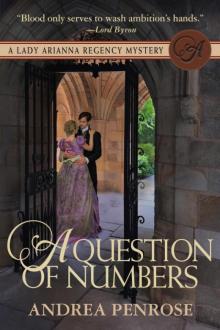 A Question of Numbers
A Question of Numbers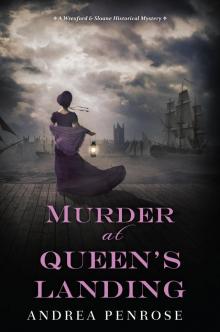 Murder at Queen's Landing
Murder at Queen's Landing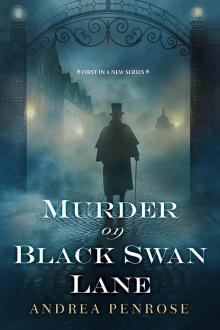 Murder on Black Swan Lane
Murder on Black Swan Lane Sweet Revenge
Sweet Revenge The Cocoa Conspiracy
The Cocoa Conspiracy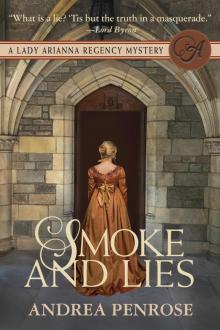 Smoke & Lies
Smoke & Lies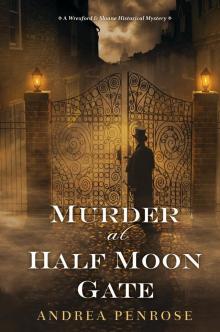 Murder at Half Moon Gate
Murder at Half Moon Gate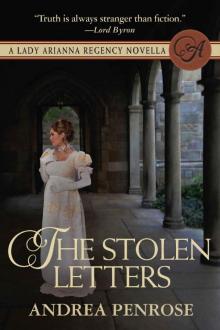 The Stolen Letters
The Stolen Letters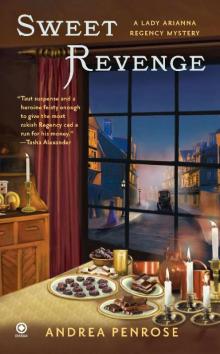 Sweet Revenge lahm-1
Sweet Revenge lahm-1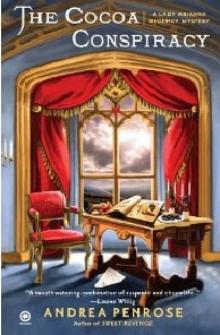 The Cocoa Conspiracy lahm-2
The Cocoa Conspiracy lahm-2